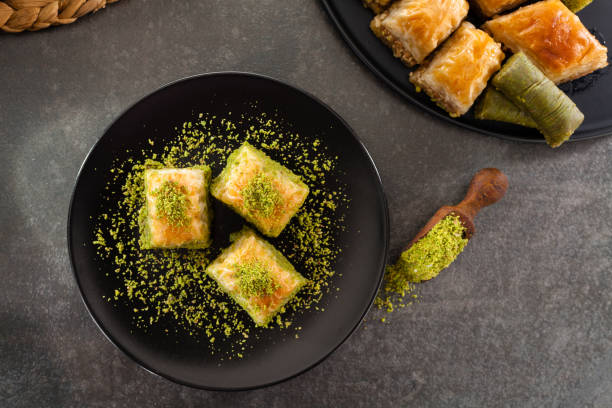Baklava, one of Turkey’s most iconic desserts, is much more than a sweet treat. It is a cultural symbol woven into the fabric of Turkish celebrations and special occasions. From weddings to religious holidays like Bayram, baklava holds a place of honor on the table, signifying abundance, joy, and togetherness.
Baklava in Turkish Weddings
Weddings in Turkey are grand celebrations filled with traditions, and baklava is an integral part of these joyous events. As a dessert that represents sweetness and prosperity, baklava is often served to guests during the wedding feast. It is meticulously prepared, with layers of paper-thin phyllo dough, rich nuts, and golden syrup or honey, symbolizing the care and effort invested in the union of two families.
In some regions, the bride’s family presents trays of homemade baklava to the groom’s family as a gesture of goodwill and unity. This act underscores the importance of hospitality and the sharing of blessings in Turkish culture. The quality and presentation of the baklava often reflect the pride and dedication of the family, making it a meaningful part of the wedding tradition.
Baklava During Religious Holidays
Religious holidays, especially Eid al-Fitr (Ramazan Bayramı) and Eid al-Adha (Kurban Bayramı), are occasions when baklava takes center stage. Families prepare large batches of baklava to share with loved ones and guests who visit their homes. The act of offering baklava, along with Turkish coffee or tea, embodies the spirit of generosity and gratitude.
During these holidays, baklava becomes a unifying element, connecting families and neighbors. The preparation often involves multiple generations coming together, turning the kitchen into a lively hub of activity. From rolling out delicate phyllo sheets to layering nuts and drizzling syrup, every step is a shared labor of love.
Cultural Traditions Around Baklava
Beyond weddings and religious holidays, baklava is a staple at many other celebrations, such as births, anniversaries, and festivals. It serves as a universal symbol of goodwill and celebration. In Turkish households, it is common to prepare baklava for special guests or to bring it as a gift when visiting someone’s home.
The presentation of baklava is as significant as its preparation. Traditionally, baklava is served on ornate trays or in beautifully decorated boxes, reflecting the importance of the occasion. In modern times, boutique baklava shops have elevated the art of presentation, offering luxurious packaging that enhances its appeal as a thoughtful gift.
The Preparation of Baklava: A Culinary Tradition
The process of making baklava is an art form that requires skill, patience, and dedication. Traditional recipes have been passed down through generations, preserving the authenticity of this cherished dessert. The finest baklava is made with high-quality ingredients, including fresh nuts, clarified butter, and handmade phyllo dough.
Making baklava is often a communal activity, particularly during festive periods. Families and friends gather to prepare large quantities, sharing stories and laughter as they work. This collaborative effort strengthens bonds and reinforces the communal values central to Turkish culture.
A Modern Take on a Timeless Classic
While traditional baklava remains a staple, contemporary interpretations have emerged, adding new dimensions to this beloved dessert. From chocolate-dipped baklava to variations with exotic nuts like macadamia or pecan, baklava has adapted to modern tastes while retaining its essence. Vegan and gluten-free options have also become popular, ensuring that everyone can enjoy this iconic treat.
For those seeking premium baklava for special occasions, trusted providers like exporgin.com offer a curated selection that combines tradition with innovation. These options ensure that your baklava not only tastes exquisite but also reflects the cultural significance it embodies.
Baklava—A Sweet Connection to Culture
Baklava is more than just a dessert; it is a celebration of Turkish heritage, community, and tradition. Whether served at a wedding, shared during Bayram, or gifted to loved ones, baklava carries with it the values of generosity, hospitality, and joy. Its enduring appeal lies not only in its rich flavors but also in the stories and connections it fosters.
As you savor a piece of baklava, you partake in a tradition that spans centuries, bringing people together in moments of happiness and gratitude. This timeless dessert continues to be a sweet reminder of the beauty of Turkish culture and the power of shared traditions.
Explore the role of baklava in Turkish celebrations, from weddings to Bayrams. Discover its cultural traditions and timeless appeal.


